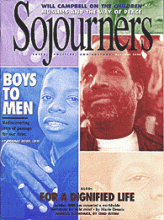In 1977, the Church of England set out to modernize the Lords Prayer. Each line of praise, petition, and eschatological yearning was altered, save one: "And deliver us from evil." The scholars and liturgists who participated in this process did not believe that phrase needed any updating. Evil, it seems, is with us always.
And evil, as a concept, is pretty popular today. While angels are the rage in pop religious circles, people busy confronting evil structures and fighting the powers are searching for clarity: Why is there so much suffering? How can there be so much pain in a world created by the whisper of an omnipotent and merciful God? Christian social activists, since the social reform movements early in this century (and before, though in different terms), have had an explanation. Evil structures, be they racism, sexism, classism, ethnocentricism, militarism, homophobia, or other discriminatory siblings, control the lives of the just and unjust alike.
Still today, the bulk of analysis within the progressive church, while acknowledging individual flaws, identifies evil as structures that hold back, predetermine, invade and violate, judge, and categorize. Several good books try to demonstrate divine activity in the face of the existence of evil.
Emilie M. Townes broad collection of essays A Troubling in My Soul: Womanist Perspectives on Evil and Suffering (Orbis Books, 1993) uses Alice Walkers definition of womanist to magnify the common experiences of suffering by African-American women. Cheryl A. Kirk-Duggan expands upon her contribution in Troubling in her own work, Exorcising Evil: A Womanist Perspective on the Spirituals (Orbis Books, 1997), using the text and tune of African-American spirituals to frame the transformational opportunities for a suffering people. Careful and concise, Kirk-Duggan contributes greatly to womanist ethical thought.
Read the Full Article
